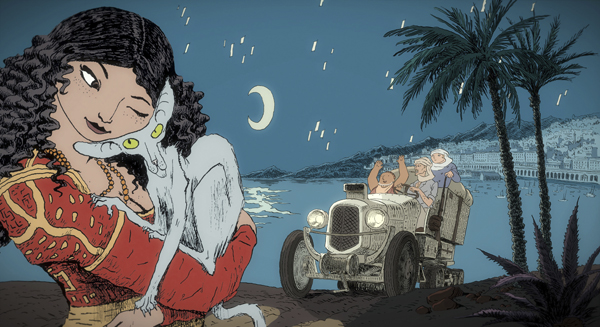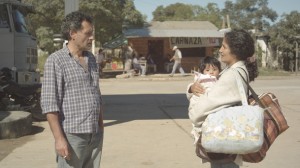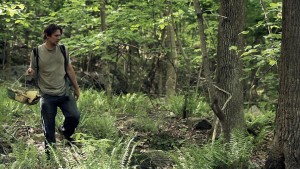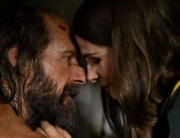
A scene from THE RABBI'S CAT (The Film Society of Lincoln Center)
This year, New Directors/New Films shakes up its usual art house lineup a little bit. The 41st edition jumps on the animated 3D bandwagon with The Rabbi’s Cat and steps into the grindhouse with a kill-a-thon from Indonesia, The Raid: Redemption. In what is another first, a surprise selection closes the series on April 1, the identity of which won’t be known until the lights go down. (This looks like it could become a trend for the Film Society of Lincoln Center, which co-presents along with the Museum of Modern Art—Hugo previewed at FSLC’s New York Film Festival last fall unannounced.) This year’s expanded programming even spotlights Stanley Kubrick’s little-seen first feature, 1953’s Fear and Desire.
The Raid opens nationwide the day after its screening, followed by some of this year’s stronger selections—Breathing; How to Survive a Plague; and Oslo, August 31st. They will be coming to a theater (hopefully) near you in the months ahead. The following films, from the most recommended on down, haven’t yet found a distributor. I would be shocked if many of them don’t eventually find one.
The tragic and galvanizing Crulic: The Path to Beyond joins other recent smart, boundary breaking animated films that that are, at their core, nonfiction: Waltz with Bashir (2008) and A Room and a Half (2009). All three are based on real-life figures/events. The blend of animation in Crulic, from hand drawn to stop-motion, makes what at first appears to be an ordinary life fantastic and then steadily nightmarish after Claudiu Crulic, a 33-year-old Romanian immigrant living in Poland, is wrongly arrested for theft. From the get-go, there is a sense of foreboding; it’s narrated from beyond the grave. Eloquent and with a burst of imagination, director Anca Damian draws international audiences to this appalling case of apathetic justice. Kent Turner
If the purpose of ND/NF is to bring promising new talents to appreciative cinephiles that might not otherwise learn of their work, I can think of no purer example than Kleber Mendoça Filho’s debut feature. Drawing upon some of the now-familiar elements of corruption, class tension, and deception seen in other recent Brazilian films—including Elite Squad: The Enemy Within, whose Irandhir Santos is just as compelling and far more mysterious here—the director displays at every turn both a boldness and a delicacy that signal the arrival of a master storyteller. Set mostly on a single block in Brazil’s fifth largest city, Neighboring Sounds presents a wide range of characters and then methodically peels away the layers of their public personae. But no one is lost in a blur or reduced to mere type. Santos plays the head of a neighborhood security team, and the themes of safety and trust play out in various ways, all of them smart and compulsively watchable. Some of the main storylines are concluded off-screen, and a climactic confrontation is left dangling—visually, that is, for there can be little doubt about what happens. Still, this may lead to frustration for some audiences. But for me, the ending is not an echo of, say, The Sopranos’ final episode, not with a film whose chief strength is the power of shadowy suggestion and the sense that all we ever observe of each other are fragments of the truth. Peter Gutierrez

Leyla Zareh in GOODBYE (The Film Society of Lincoln Center)
Iranian director Mohammad Rasoulof daringly filmed the claustrophobically realistic, visually dark Goodbye under the similar restricted conditions as Jafar Panahi and Mojtaba Mirtahmasb’s This Is Not A Film, after his arrest and conviction for anti-government acts, and similarly he smuggled it out while seeking appeal. Noora (a brave Leyla Zareh) is under intense personal and political pressures that are gradually revealed through the increasingly ratcheted up tension. She’s dealing with conflicting advice about a difficult pregnancy, she’s barred from working as a lawyer, and only sporadically receives calls from her journalist husband, who is hiding out far from Tehran. Alone, drawing on incredible emotional reserves and determination, she has to navigate the corrupt and Byzantine shoals of the underground and official bureaucracies to try to get out of the country. It’s as much a heart-pounding tale of suspense as it is an achingly sympathetic portrait of the impossible choices activist women face in Iran today. Nora Lee Mandel

German de Silva and Hebe Duarte in LAS ACACIAS (The Film Society of Lincoln Center)
From Argentina, the taciturn and ultimately tender Las Acacias defines the term “slow-burning charmer.” Don’t be put off by long, continuous scenes of Rubén (a great Germán de Silva) driving, smoking, and sipping yerba mate as he drives the back roads from Paraguay to Buenos Aires, hauling lumber and transporting a paying passenger, Jacinata (Hebe Duarte) over the border. To his initial surprise and annoyance, she has brought along her baby daughter (played by an infant who’s a natural in front of the camera). Though you can predict what might happen in this unique take on the boy-meets-girl story, both actors give performances that feel like the characters could have just walked off the street onto the set. The English subtitles are almost unnecessary—you can read their every thought, and silence reveals more than speech. This gem has just been picked up by Outsider Pictures. KT
Two films by first-time American directors point to the emergence of mumblecore 2.0 and two talents to watch, if they can get beyond the autobiographical inspirations. An Oversimplification of Her Beauty features the familiar, albeit African-American, post-graduate Brooklyn hipster working a deadening entry-level job while stalled in a platonic relationship with his BFF girlfriend (as in HBO’s How To Make It In America, MTV’s I Just Want My Pants Back, etc.). But writer/director/illustrator/star Terence Nance builds on his 2010 short “How Would You Feel?” to leap from vérité scenes into an explosion of magical animation and graphic design styles. Unusually in what tends to be a navel-gazing genre, the spirited women in his life sound off about him, too.
Writer/director Adam Leon’s Gimme the Loot refreshes a familiar trope by following loquacious, profanity-spewing Bronx high school kids. Like an updated, urban summer take on Rob Reiner’s The Sure Thing (1985), Malcolm (Ty Hickson) and Sofia (Tashiana Washington) set out on an entertainingly picaresque quest through New York City locales not usually seen in the movies to prove that they are great graffiti artists. They meet up with a (seemingly endless) assortment of quirky characters with an amusing range of tattoos, accents, and habits, and get into—and just barely out of—misdemeanor situations and romantic detours. (Sundance Selects just picked up this up shortly before the festival.) NLM
Set in rural Colombia, Alejandro Landes’s Porfirio follows rancher Porfirio Ramirez Aldana (played by Aldana himself), who has been paralyzed from the waist down, day to day. (The film is based on Aldana’s life.) Only through tiny clues do we learn the reason for his paralysis (shot by a police officer) and what his larger plans are (his revenge scheme against the government comes only in the last 10 minutes). Both the experience and the significance of this plot, which is wonderfully paced and even more wonderfully photographed, are tough to forget. Porfirio’s mute struggle against an uncaring state is contrasted by the minutiae of family life, which for Porfirio isn’t altogether bad. He has a loving son and a loving woman we take to be his girlfriend. Both care for him in their unique ways, and the trio seems quite happy in their modest surroundings. But ultimately Porfirio cannot overcome his internal resentment, and no matter how at peace we as the audience may be with his quiet, methodical lifestyle, we must remember that we are on the outside, looking in. Porfirio alone knows how he truly feels. Michael Lee

Jason Cortlund in NOW, FORAGER (The Film Society of Lincoln Center)
Now, Forager: A Film About Love and Fungi is one of the most pungent and unself-conscious films about downward mobility. Married couple Lucien (Jason Cortlund, who co-directs with Julia Halperin) and Regina (Tiffany Esteb) are expert cooks, both pushing 40 and making a precarious living foraging fungi from the wild for shi-shi New York restaurants. Regina lucidly acknowledges: “We’re at the mercy of the mushroom gods.” They have no savings and no health insurance. Needing stability, she jumps at the chance to work at a high-end eatery, and he takes off to forage the countryside. Homeless, Lucien lives off the land, makes his vehicle his home, and swears off his “cancerous” cell phone (yet he still travels with his Apple laptop). Individually uncompromising and self-centered, both can be their own worst enemies. With a disarming lack of pretense, these directors lay out all their cards on the table. Forager is probably too low-key for most distributors, but New York moviegoers searching for a new and sincere voice should take note. KT
Donoma (incongruously titled “The Day Is Here” in Sioux ) opens like a typical teen drama of the bad boy romancing the good girl, but debut writer/director Djinn Carrénard quickly and unpredictably expands it into an ultra lo-fi, somewhat improvisatory Crash for a new French generation. Carrénard tracks the confusing lives of seven intersecting, multiracial, unevenly credible young characters who pass, photograph, bed, and debate each other on and off the Paris Metro. Filmed episodically, the frenetic jumping around in time, place, and style belies surprisingly heavy and poignant discussions of love, death, spirituality, and cultural/racial identity. NLM
Generation P is a ribald toast to the other Pepsi Generation—the first Soviets to have a choice of name-brand products, when the U.S.S.R. was virgin territory for the manipulations of advertising. Debut feature director Victor Ginzburg closely adapts Victor Pelevin’s prescient absurdist 1999 novel (the out-of-print English edition was published as Babylon) that updated Russian post-revolutionary satire from The Twelve Chairs to the post-capitalism of the 1990s. But Ginzburg adds a riot of visual references via news footage and animated clips as he follows the rise of Babylen Tatarsky (the appealing Vladimir Yepifantsev). He takes on a cynical career of marketing spin, culminating with his induction into the cabal selling a Max Headroom-like president, who looks an awful lot like Putin. Though an American may not get all the politicians’ and oligarchs’ images or digs as they quickly fly by, the broadly nationalistic commercials of iconic international products are hilarious, and the brands are good sports to grant their use. NLM
Two films deal in very different ways with the ramifications of France’s colonial heritage in North Africa. The creative team members involved with the epic Days of Glory (2006) and Outside the Law (2010), that brought wide attention to France’s unequal treatment of North Africans before and after colonization, updates and narrows the injustice to one immigrant in the 1990s. Roschdy Zem (more known as an actor) directs a script co-written by Rachid Bouchareb (more known as a director) in Omar Killed Me, a scorching indictment of the French legal system’s treatment of illiterate Moroccan gardener Omar Raddad (played by Sami Bouajila) in a notorious, bloody Marseille murder case. The focus commendably stays on the defendant, based on his as-told-to memoir, even while the (blind) law and (prejudiced) order procedural is interwoven with the thorough, post-conviction investigation by a French journalist (Denis Podalydès), who is portrayed as a bit of a supercilious intellectual glory hound. Unfortunately, critical docudramas of racist police departments and courts railroading a noble family man are tragically familiar to American audiences, so it’s the time and setting that adds to the intensity of reliving this international cause célèbre.
The Rabbi’s Cat starts out in the Jewish community of 1920s Algiers, but when the titular cat swallows a loud parrot and starts talking, let alone debating theology and love, this exuberantly colorful animated film enters the joyfully ironic world of graphic novelist Joann Sfar, co-directing with Antoine Delesvaux. The flamboyant story of the cat’s efforts to be treated seriously as a Jew, and his lusty owners’ search for ideal places in Africa where Christians, Jews and Muslims can live together peacefully, draws (a bit unevenly) on several episodes from Sfar’s ongoing series. Joann Sfar Draws from Memory, Sam Ball’s bio-documentary now on the Jewish film festival circuit, illuminates his Algerian and Eastern European roots that are vividly displayed here and heard in Olivier Daviaud’s terrific score. The visual references to The Little Prince and the philosophical fiction a la Voltaire display a truly French joie de vivre. NLM
Teddy Bear is the very on-the-nose title of the first feature by Denmark’s Mads Matthiesen, who adapted it from his Sundance 2008 short film “Dennis.” Superstar bodybuilder Kim Kold returns as the shy, aging sportsman Dennis, who still lives at home with his overbearing mother, yet ventures out on a secret trip to Thailand where he’s finally able to meet a girl. Predictable but highly effective, Teddy Bear sees Dennis overcome the personal challenges hidden inside his 6’3,” 300 pounds of solid muscle. It’s an emotionally draining film, thanks in large part to Kold’s skill as an actor and Matthiesen’s formulaic script. The best parts are naturalistic, found between the scripted lines, like when Dennis routinely brushes his teeth standing next to his little old mother, barely half his size. Matthiesen is a talented director, despite the less than ambitious scope to this story. I wouldn’t be surprised to see him move on to great things from this. ML
It’s impossible not to compare Hemel to Shame, and not only because of the sex and the full frontal nudity dangling in front of the camera. Both films are portrayals of detachment, though Hemel (played by the absolutely gorgeous Hannah Hoekstra), doesn’t come close to the self-awareness of Shame’s Michael Fassbender. Strangely, both blunt films fixate on blurry family relationships—here, it’s between Hemel, whose name means heaven in Dutch, and her dynamic art historian father. Their body language is such that a waiter mistakes Hemel for her dad’s much younger girlfriend. Debut Dutch director Sacha Polak’s film deliberately aims for shock value. The otherwise aloof 20-something Hemel’s idea of a come-on to a guy in a club is “I have a wet c***.” And in another coincidence, both Hemel and Shame film their leads urinating. At least they have their backs to the camera. Sure, for viewers-turned-voyeurs, it’s hard to look away from the screen, but the film is less successful from a psychological point of view, even with plenty of daddy issues. KT
A movie director in the compellingly confounding Romance Joe makes the observation that “A director’s like a whore.” Then what does that make the audience? South Korean director Lee Kwang-kuk certainly doesn’t pander. He jumps from three interconnected yet disparate storylines–concerning moviemaking, lost love, and suicide. Purposely disjointed, the film starts off with an elderly couple journeying to Seoul in search of their filmmaker son who has disappeared. Figuring out the complex plot is the main draw, despite the measured pace and the repetitive and protracted two-shots. KT
Pierre Schöller’s The Minister easily has the most attention-getting opening sequence in the series: a middle-aged man’s arousing dream of a naked woman and an alligator. If only the strangeness had lasted! Periodically, there are bizarre moments, but the bloodless political power plays are as dry as a cabernet sauvignon, unless discussions of nationalizing train stations sets your heart aflutter. Olivier Gourmet stars as the coolly pragmatic and self-made French minister of transportation, but he lacks the transformation into a ruthless politico that his former allies decry. The backstabbing and flip-flopping are more methodical than Machiavellian, and the politics remain stubbornly impersonal. KT
Co-written by its star, Olga Dihovichnaya, and directed by newcomer Angelina Nikonova, Twilight Portrait is about a woman whose rape fixation takes her to the far reaches of her emotional life after she is assaulted by three police officers outside of her small Russian city. Marina is educated and well-to-do, yet she begins an illicit Stockholm Syndrome-type affair with one of the crude, working-class attackers. The filmmakers aim high in concept, but come off mostly as provocateurs as Marina’s decision-making takes turn after surprising turn. Perhaps it’s a grand retribution scheme, but much of Marina’s interior life is purposely ambiguous. Whatever indictment was supposed to be embedded here—whether of men, of cops, of the power structure—mostly gives way to an indictment of Russia itself. It is a messed up place, apparently. Marina’s story is told in a way that asks its audience to understand her psychological state. If her impulses are a large part of what fascinates these writers, I’m afraid interested to see what’s next. ML
In Huan Huan, villagers in the southwest Yunnan province hearken back to types from a Thomas Hardy novel, with some unique Chinese elements of bleak sociological interest, such as the impact of the one-child policy. The title character, a bored, pretty young woman, uses her wiles to her advantage with the handsome married doctor, but she’s pressured by her farmer parents to marry the wastrel son of a grocer to improve their status. Debut writer/director Song Chuan portrays a depressing, quarrelsome fate for those in rural China left behind by industrialization and the shift towards capitalism, but the universal roundelay of debts, jealousy, blackmail, and unfulfilled promises are drawn out too slowly to be of even much melodramatic interest. NLM
It Looks Pretty From a Distance isn’t pretty, and you won’t feel much distance once it begins. Unusually sparse dialogue and a truly opaque plot invite much speculation, but be warned. The deeper you penetrate into this highly dysfunctional Polish village and its highly unstable populace, the worse you’ll feel about the human condition. Ever read Heart of Darkness? There’s not a lot of redemption here, and though it doesn’t have a long running time, it’s a definite mood changer. This is the first feature for established visual artists Wilhelm and Anka Sasnal, and it fits right in at a more experimental festival like Rotterdam, and certainly a screening at MoMA. The photography is a highlight, and there are moments of great—however ironic—rhythmic editing, as when a demented old woman chants alone to herself in harmony with the film’s off-putting score, or when the townsmen make an unholy bonfire out of what remains of a family’s belongings. I hope you get the picture. ML





